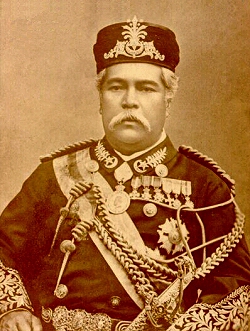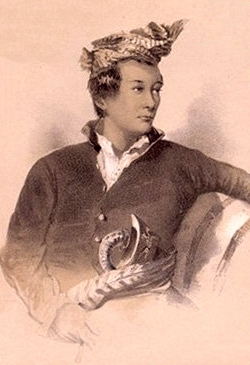Related Research Articles
Tengku Alam Shah Temenggong, Tengku Ali Iskandar Shah was a prince of the House of Bendahara (Johor), and was the oldest son of Sultan Ali, the 19th Sultan of Johor by his second wife, Daing Siti. Following his father's death in 1877, Tengku Alam and his supporters made an active pursuit to his claims for the Kesang territory and was publicly proclaimed as the Sultan of Johor and Pahang with the regnal name of Alauddin Alam Shah during his marriage ceremony in 1879. The proclamation briefly alarmed Maharaja Abu Bakar, who feared that his political position may be threatened. Within the same year, a brief civil war erupted in Jementah, after repeated attempts to get his claims to the Kesang territory being recognised failed.
Temenggong or Tumenggung is an old Malay and Javanese title of nobility, usually given to the chief of public security.

Sultan Sir Abu Bakar Al-Khalil Ibrahim Shah ibni Almarhum Temenggong Seri Maharaja Tun Daeng Ibrahim was the Temenggong of Johor. He was the 1st Sultan of Modern Johor, the 21st Sultan of Johor and the first Maharaja of Johor from the House of Temenggong. He was also informally known as "The Father of Modern Johor", as many historians accredited Johor's development in the 19th century to Abu Bakar's leadership. He initiated policies and provided aids to ethnic Chinese entrepreneurs to stimulate the development of the state's agricultural economy which was founded by Chinese migrants from Southern China in the 1840s. He also took charge of the development of Johor's infrastructure, administrative system, military and civil service, all of which were modelled closely along Western lines.

The Johor Sultanate was founded by Malaccan Sultan Mahmud Shah's son, Sultan Alauddin Riayat Shah II in 1528. Johor was part of the Malaccan Sultanate before the Portuguese conquered Malacca's capital in 1511. At its height, the sultanate controlled modern-day Johor, Pahang, Terengganu, and territories stretching from the river Klang to the Linggi and Tanjung Tuan, Muar, Batu Pahat, Singapore, Pulau Tinggi and other islands off the east coast of the Malay peninsula, the Karimun islands, the islands of Bintan, Bulang, Lingga and Bunguran, and Bengkalis, Kampar and Siak in Sumatra. During the colonial era, the mainland part was administered by the British, and the insular part by the Dutch, thus breaking up the sultanate into Johor and Riau. In 1946, the British section became part of the Malayan Union. Two years later, it joined the Federation of Malaya and subsequently, the Federation of Malaysia in 1963. In 1949, the Dutch section became part of Indonesia.

Bendahara is an administrative position within classical Malay kingdoms comparable to a vizier before the intervention of European powers during the 19th century. A bendahara was appointed by a sultan and was a hereditary post. The bendahara and the sultan shared the same lineage.

The Sultan of Johor is a hereditary seat and the sovereign ruler of the Malaysian state of Johor. In the past, the sultan held absolute power over the state and was advised by a bendahara. Currently, the role of bendahara has been taken over by first minister with the constitutional monarchy system via Johor State Constitution. The Sultan is the constitutional head of state of Johor. The Sultan has his own independent military force, the Royal Johor Military Force. The Sultan is also the Head of Islam in Johor state.

Sultan Sultan Ali Iskandar Shah I ibni almarhum Sultan Ahmad Hussein Muazzam Shah I was the 20th Sultan of Johor, who succeeded his father, Sultan Hussein after the latter died of natural cause in 1835. Over the next twenty years, Sultan Ali's claims to the office of Sultan of Johor were only recognised by some merchants and a few Malays. Like his father, Sultan Ali's was much of a puppet monarch and played a minimal role in the administrative affairs of the state, which came under the charge of the Temenggong and the British. In 1855, Sultan Ali ceded the sovereignty rights of Johor to Temenggong Daeng Ibrahim, in exchange for a formal recognition as the "Sultan of Johor" by the British and a monthly allowance. Following the secession of Johor, Sultan Ali was granted administrative charge over Muar until his death in 1877, and in most administrative matters, was often styled as the "Sultan of Muar".

The Jementah Civil War broke out in 1879 in Jementah in northern Johor when Tengku Alam Shah, the heir of late Sultan Ali of the autonomous principality of Muar refused to surrender the principality to the central administration of Abu Bakar, the then Maharaja of Johor.
Sultan Hussein Mua'zzam Shah ibni Mahmud Shah Alam was the 19th ruler of Johor-Riau. He signed two treaties with Britain which culminated in the founding of modern Singapore; during which he was nominally given recognition by the British as the Sultan of Johor and Singapore in 1819 and the Sultan of Johor in 1824.
Daeng Parani was one of the five Bugis brothers from Luwu, Sulawesi, who established political dominance over the royal houses of Peninsular Malaysia. Daing Parani became personally embroiled in the politics of the Sultanates of Johor, Riau, Lingga and Pahang in the early 18th century.

Muar or Bandar Maharani, is a historical town and the capital of Muar District, Johor, Malaysia. It is one of the most popular tourist attractions in Malaysia to be visited and explored for its food, coffee and historical prewar buildings. It was recently declared as the royal town of Johor by Sultan Ibrahim Sultan Iskandar and is the fourth largest urban area in Johor. It is the main and biggest town of the bigger entity region or area of the same name, Muar which is sub-divided into the Muar district and the new Tangkak district, which was upgraded into a full-fledged district from the Tangkak sub-district earlier. Muar district as the only district covering the whole area formerly borders Malacca in the northern part. Upon the upgrading of Tangkak district, the Muar district now covers only the area south of Sungai Muar, whilst the northern area beyond the river is in within Tangkak district. However, both divided administrative districts are still collectively and fondly called and referred to as the region or area of Muar as a whole by their residents and outsiders. Currently, the new township of Muar is located in the Bakri area.

Tun Habib Abdul Majid bin Tun Ali bin Tun Muhammad was the 19th Bendahara of the Johor Sultanate during the late 17th century. The Johor Sultanate under Sultan Mahmud Shah II saw a gradual decline of royal authority during Tun Habib's tenure as the Bendahara of Johor. Internal challenges within the Sultanate faced by Tun Habib consolidated his power as the Bendahara, in which case the Bendahara monopolised legitimate authority over the Johor Sultanate by the 1690s. After his death, Tun Habib's descendants spanned throughout the Johor Sultanate and established ruling houses in Riau-Lingga, Johor, Pahang and Terengganu.
Sri Paduka Dato' Bendahara Sri Maharaja Tun Muhammad Tahir ibni Almarhum Dato' Bendahara Sri Maharaja Tun Ali was the fifth Raja Bendahara of Pahang who ruled the state until his death in 1863 in the Pahang Civil War.
Sayyid ʿAbdullāh bin Shaykh al-ʿAydarūs was a Hadhrami religious leader who lived in the 16th century and a descendant of Abu Bakr al-ʿAydarūs, a prominent saint who started the al-ʿAydarūs branch of the Bā ʿAlawiyyah clan.
Sri Paduka Dato' Bendahara Paduka Raja Tun Abdul Majid ibni Almarhum Dato' Bendahara Sri Maharaja Tun Abbas, (1718–1802) was the 21st Bendahara of the Johor Sultanate, who was believed by historians to be the first Raja Bendahara of the Pahang Kingdom that gained effective control over the principality, following the gradual dissolution of the Johor by the end of the 18th century.
Sri Paduka Dato' Bendahara Sri Maharaja Tun Ali ibni Almarhum Dato' Bendahara Paduka Raja Tun Koris was the 23rd and the last Bendahara of Johor Sultanate, and the fourth Raja Bendahara of the Pahang Kingdom who reigned from 1806 to 1857.

The Pahang Civil War, also known as the Brothers War or the Bendahara War was a civil war fought from 1857 to 1863, between forces loyal to the reigning Raja Bendahara Tun Mutahir, and forces loyal to his brother Tun Ahmad, over the succession to the throne of Pahang.

The Bendahara dynasty is the current ruling dynasty of Pahang, Terengganu and Johor Sultanate, a constituent state of Malaysia. The royal house were of noble origin, holding the hereditary position of Bendahara in the courts of Singapura, Melaka and Old Johor since at least from the end of the 13th century.

Raja Temenggong Tun Daeng Ibrahim bin Temenggong Daeng Abdul Rahman was the Temenggong of Johor and later the de facto Maharaja of Johor from 1855 to 1862.
References
- R. O. Winstedt, A History of Johore (1365–1941), (M.B.R.A.S. Reprints, 6.) Kuala Lumpur: Malaysian Branch of the Royal Asiatic Society, 1992, ISBN 983-99614-6-2
- R. O. Windstedt, Temenggungs of Muar, Journal of Malayan Branch of Royal Asiatic Society, Vol X Part 1, 1932
- Tun Suzana Tun Othman, Ahlul Bait Rasulullah SAW dan Kesultanan Melayu, Crescent News Sdn Bhd, 2008, ISBN 983-3020-12-7